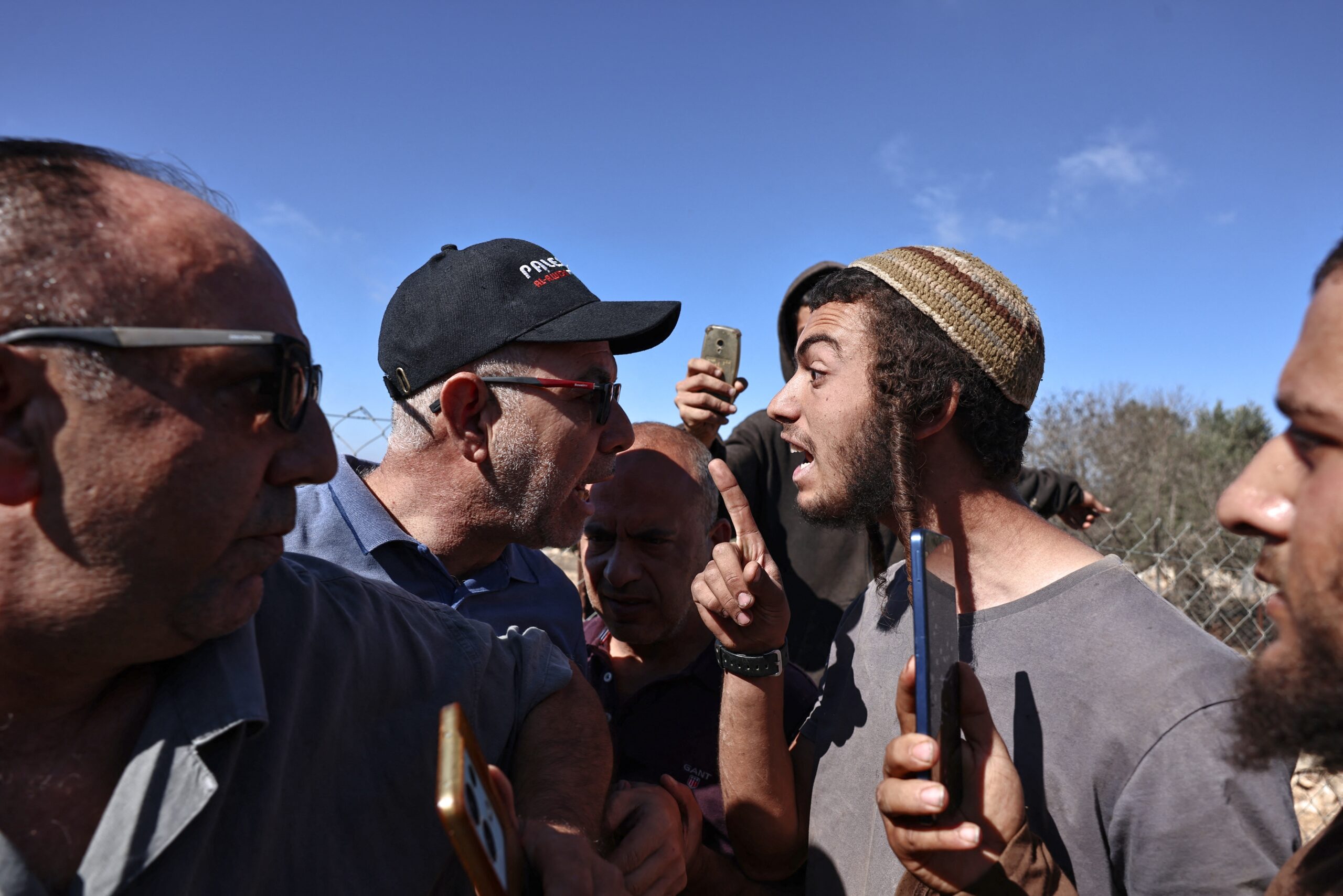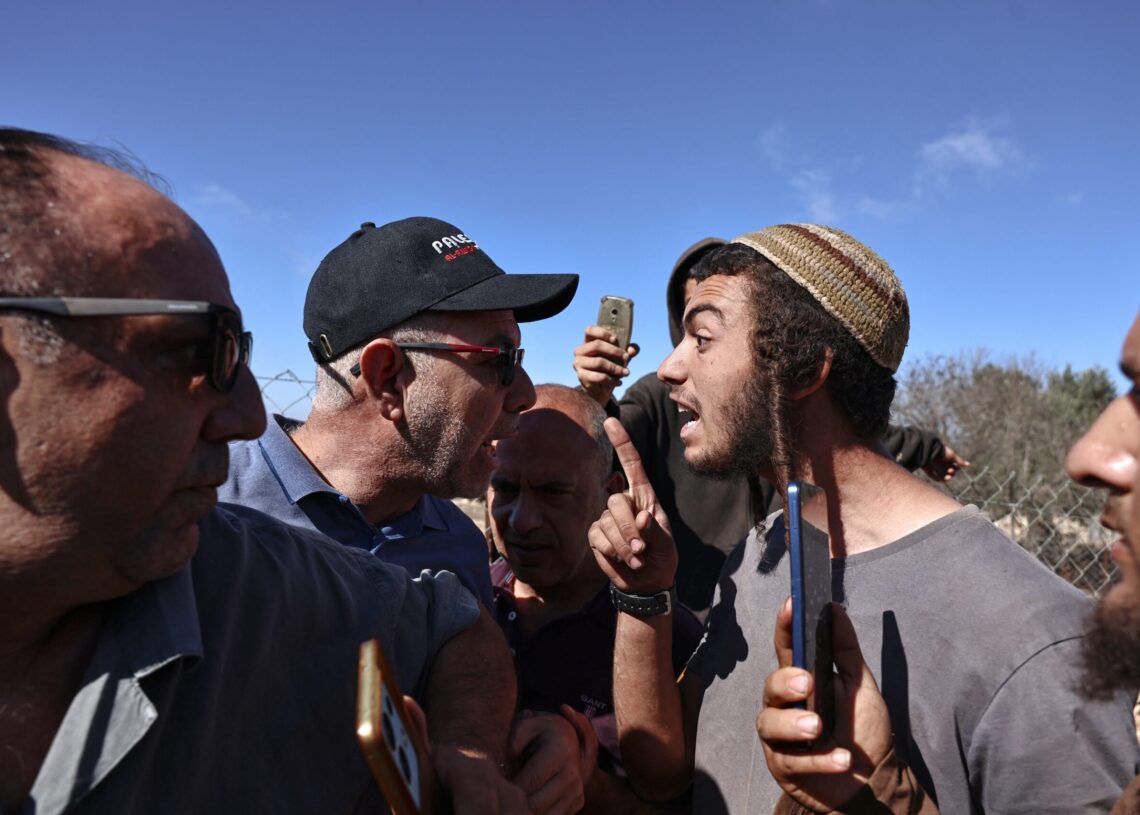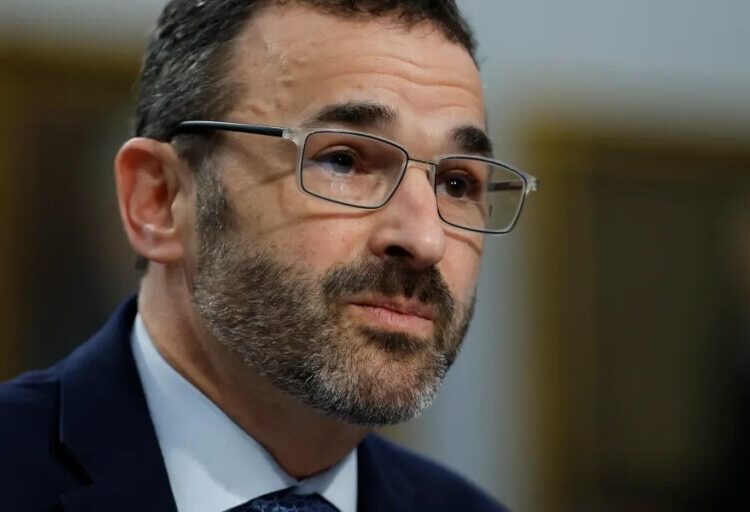
AL-MUGHAYYIR, West Bank — For Palestinian farmers in the occupied West Bank, the annual olive harvest has become a time of terror.
Many of those working the fields this fall keep one eye on the road, in case Israeli settlers descend from the hilltops to attack. In one assault, a 54-year-old Palestinian woman was clubbed unconscious. In another, a 50-year-old man was beaten so badly that he was unable to escape his car, which was set ablaze. On Tuesday, two weeks on, he was still in the ICU.
AL-MUGHAYYIR, West Bank — For Palestinian farmers in the occupied West Bank, the annual olive harvest has become a time of terror.
Many of those working the fields this fall keep one eye on the road, in case Israeli settlers descend from the hilltops to attack. In one assault, a 54-year-old Palestinian woman was clubbed unconscious. In another, a 50-year-old man was beaten so badly that he was unable to escape his car, which was set ablaze. On Tuesday, two weeks on, he was still in the ICU.
Across 77 towns and villages, according to U.N. figures, gangs of Jewish extremists have burned cars, looted farming equipment and vandalized more than 4,000 trees and saplings. The number of attacks by Israeli settlers on Palestinians — an average of eight incidents a day — is the highest since the United Nations began documenting them in 2006.
In some cases, witnesses said, Israeli soldiers were present or even involved in the violence. Serious assaults are rarely investigated by Israeli authorities, and even more rarely result in arrests, according to rights groups monitoring the situation.
The Israel Defense Forces, which controls the West Bank, said it “firmly condemns all forms of violence, which divert the attention of commanders and soldiers from their primary mission of defense and counterterrorism.”
Attacks by Israeli settlers, who are often open about their goal of displacing Palestinians from rural parts of the West Bank, have surged under Prime Minister Benjamin Netanyahu’s government, which includes leading figures pressing for Israeli annexation of the occupied territory. Even outside the olive harvest, which lasts just over a month, Palestinian farming communities in the central West Bank have been penned into shrinking spaces, as the Israeli government increases its support for settler expansionism.
Farhan Haq, deputy spokesman for the U.N. secretary general, said the organization gets daily reports of “other settler actions — involving intimidation, trespassing, threats and harassment — that are not reflected in the published figures but nevertheless fuels the coercive environment that pushes Palestinians off their farmland and out of their homes and communities.”
But it is during the harvest months that farming communities are most vulnerable, residents say. Many rely on the income from their trees and livestock, giving these farmers little choice but to try reaching their fields.
Yisrael Ganz, chairman of the Yesha Council, an umbrella organization of West Bank settlements, criticized the recent attacks. “The pictures we’ve seen in the last days and weeks, done by anarchists, don’t represent at all the hundreds of thousands of law-following residents of Judea and Samaria, and I strongly condemn them,” he said, using the biblical names for the territory. He added: “This kind of violence, which puts people’s lives at risk and breaks the rule of law, is not okay in any way.”
In a statement, the military said it “operates to ensure the olive harvest season proceeds in a proper and safe manner for all residents.” The IDF added: “In cases where disruptions to the harvest occurred, forces were instructed to take the necessary measures to ensure its continuation without interference.”
The olive harvest had traditionally been a festive time. Palestinian families brought picnics to the fields and cooked stews of tomato and hot peppers on open fires beneath the trees.
But now, in the groves outside the village of Khirbet Abu Falah, Adam Abu Alia, 31, parks his car facing the road when he and his family arrive to harvest olives, hoping this will save time if they have to run, he said. He travels as light as possible — just water and snacks for the long day under the sun.
Instead of picking the purple and green fruit by hand, which protects the ancient trees, Abu Alia said his family uses a mechanical trimmer this year to get the job done and get out. He is so afraid of being spotted by settlers that he said he feels “like a thief.” The owner of the land, a fellow Palestinian, was too scared to pick the olives himself and agreed to split the harvest with Abu Alia and his family if they bore the risk.
Last month, dozens of Palestinian families had come as a group to harvest the groves near the next-door village of Turmus Ayya, hoping there was safety in numbers. A video recorded that day captured the moment that a gang of settlers came over the top of a hill, some throwing stones at the farmers. A moving Palestinian vehicle was quickly overtaken, and the man inside jumped out, chased by the assailants as he fled. The families scattered as fast as they could, witnesses said, but it was as if the settlers were hunting them.
Another video, recorded by independent American journalist Jasper Nathaniel, showed a masked settler in jeans and sneakers sprinting toward one of Abu Alia’s cousins, a woman named Afaf, clubbing her to the ground and then hitting her slumped body again.
“They were kicking me on the ground,” Afaf said in an interview days after the attack. “My head, my shoulders, my back. I tried to scream but I couldn’t.” She moved gingerly as she pointed to her wounds. Her hand was bandaged, and her eye bruised. Doctors had used 24 staples to close the deep gash on her head, she said.
“They acted like they wanted to kill me,” Afaf said. In what she had thought were her last moments, she said she thought mostly of her children and how much she loved them.
Israeli soldiers had been outside Turmus Ayya minutes before, while settlers were already gathering, said Palestinian American local council member Yaser Alkam. No soldiers returned to the scene until the following day, according to witnesses.
The Israeli military gave a different account in a statement. “Upon receiving the report, IDF troops and the Israel Police were dispatched to the scene to disperse the confrontation,” the military said. “Upon the arrival of the forces, the confrontation was defused. Further handling was transferred to the Israel Police.”
In a joint statement Sunday, three weeks after the incident, the police and Shin Bet security service said they had arrested a person “on suspicion of committing an assault and causing injury.” Neither force responded to questions about why no one else had been arrested for a role in the attack.
A report by Israel’s Haaretz newspaper found recently that the number of police investigations into Jewish nationalist and terrorism-related cases in the West Bank has fallen this year, even as the number of complaints filed by Palestinians rises. And according to figures from Israel’s Channel 12, investigations are down 73 percent since 2022. “The situation is out of control, the IDF is doing nothing,” a headline from Yedioth Ahronot, another prominent Israeli daily, said last week.
The fear of settler attacks, combined with Israeli restrictions on the movement of Palestinians in the West Bank, has caused the number of olive pickers to dwindle. Abu Alia’s own olive crop in al-Mughayyir village had been destroyed after the Israeli army uprooted 3,000 trees following a shooting outside the nearby settlement outpost of Adei Ad in which an Israeli civilian suffered minor wounds.
“Uprooting the trees … was intended to deter everyone,” said the head of the army’s Central Command, Maj. Gen. Avi Bluth, according to local media. “Not just this village, but any village that tries to raise a hand against the residents” of settlements.
Despite the challenges and dangers, some Palestinian farmers still try to reach their land. Land left unattended is routinely seized by settlers, rights groups say.
At the olive press in Turmus Ayya on a recent day, Palestinian farmers listed the tracts of land to which they had lost access. Shouting over the bellow of the machinery, one man said he was down from 25,000 trees to just 5,000. Others reported a similar decline. Because it takes 60 kilograms (about 130 pounds) of the fruit to make just one gallon of oil, many families had picked only enough for use in their pantries rather than to sell, as they usually would, according to Alkam.
As the olive harvest has progressed, Abu Alia and his family say they have continued to get phone notifications nearly every day of fresh attacks. In the first week of November, settlers caught Hikmat Shteiwi, a father of four, in the village of Kafr Qaddum, beating him so badly that he was found unconscious in his car, which they set on fire. Near the village of Beita, days later, settlers attacked residents, solidarity activists and Reuters photographer Raneen Sawafta, who had been there to document the attacks.
Nor have olive farmers been the only targets. On Tuesday, dozens of masked settlers attacked an industrial zone in the northern West Bank, wounding at least four Palestinians and setting fire to a dairy factory that employed many Palestinians across the region. The army said it had detained “several” Israeli civilians after masked men set upon Palestinian residents in the villages of Beit Lid and Deir Sharaf. Vigilantes later attacked a military vehicle, the army said. Three out of the four detainees were released the following day, according to local media reports.
In al-Mughayyir, residents on the edge of the village said they struggled to sleep. Men and boys sleep in shifts and act as lookouts in case settlers approach. “No one else is coming to help us,” 17-year-old Lana Abu Alia said. Settlers had killed one of her relatives on the roof a year earlier.
Lana’s family members had reinforced the metal gates around the house, but they did not think they would save them. “If they come, all the gates will do is buy us time,” said her mother, Maryam. “To warn others that the settlers have arrived.”
The post Israeli settler attacks in West Bank threaten vital olive harvest
appeared first on Washington Post.




